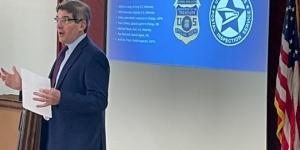Press Release
Acting United States Attorney Joshua S. Levy Recognizes World Elder Abuse Awareness Day
For Immediate Release
U.S. Attorney's Office, District of Massachusetts
Information and vigilance remain key elements to preventing elder abuse
BOSTON – In observation of World Elder Abuse Awareness Day (WEAAD), Acting United States Attorney Joshua S. Levy touted the District of Massachusetts’ ongoing commitment to protect older Americans in the fight against elder abuse, neglect and financial exploitation. Since 2006, WEAAD has been commemorated to promote awareness and increases understanding of the many forms of elder abuse as well as the resources available to those at risk. Highlighting the partnership between law enforcement and the public, Acting U.S. Attorney Levy emphasized the importance of awareness and education.
“Millions of adults aged 60 and older become victims of abuse every year – with nearly one in 10 annually experiencing some form of elder abuse, neglect and financial exploitation,” said Acting U.S. Attorney Levy. “Protecting seniors from abuse and exploitation is one of our top priorities. Our office has successfully prosecuted a number of individuals in recent years who have preyed on this vulnerable population through financial scams. We remain relentless in this fight for elder justice, and we will continue to work with our federal, state and local law enforcement and community partners to hold people accountable for such misconduct and recover stolen funds whenever possible.”
Elder abuse is an act that knowingly, intentionally, or negligently causes or creates a serious risk of harm to an older person by a family member, caregiver, or other person in a trust relationship. Such harm may be financial, physical, sexual, or psychological. The Justice Department maintains a variety of programs and initiatives to combat elder abuse.
Earlier this year, Chukwunonso “Douglas” Umegbo, a/k/a James Abbott, a/k/a Michael Philips, a/k/a Richard Armani, 39, formerly of New Bedford, Mass. was sentenced to more than three years in prison for wire fraud and money laundering charges involving funds obtained from “romance scam” victims. From 2018 through 2019, Umegbo used fake identity documents to open bank accounts in the greater Boston area, which he used to receive more than $568,000 from at least 45 romance scam victims. Among them was a senior who fell victim to the scheme following the loss of her husband of 57 years and lost her car, house and retirement savings to the fraud scam.
In honor of this year’s WEAAD, the U.S. Attorney’s Office for the District of Massachusetts has developed an Elder Justice Outreach Prevention Program aimed at bringing awareness, education and resources to older adults across Massachusetts in partnership with local police departments and older adult centers. A team made up of members from the U.S. Attorney’s Office, the IRS and USPIS who travel across the state, educating older adults about heightened awareness in the areas of online scams; romance scams; contractor scams; and telemarketing scams, to name a few.
Yesterday, Acting U.S. Attorney Levy spoke to over 500 hundred older adults alongside Bristol County District Attorney Tom Quinn at the Bristol County Celebration of Seniors about important information they need to protect themselves from financial exploitation and how to report elder fraud.
The Transnational Elder Fraud Task Force marshals federal and state agencies working collaboratively to investigate and prosecute foreign-based schemes that target older Americans. In addition to aggressively investigating the individuals, organizations and networks responsible for these crimes, this initiative provides the public with information to guard against both traditional scams, like tech support fraud, as well as trending schemes, such as romance scams.
Using one scam to perpetrate or conceal another, some fraudsters rely on money mules to move the proceeds of their illegal activity. Preying on the good will or financial vulnerability of their targets, scammers recruit people, many times older victims, to participate in schemes to move money in ways that avoid notice. The Money Mule Initiative identifies and addresses money mule activity to disrupt these fraud schemes, and helps people to recognize and avoid participation in perpetuating fraud.
To help older individuals and their families identify and avoid fraudulent activity, the Justice Department provides Senior Scam Alerts with information about the tactics used in specific schemes. For example, in Social Security Administration Impostor schemes, scammers impersonate government administrators and falsely reporting suspicious activity to request that the victims provide their Social Security number for confirmation. In Tech Support scams, fraudsters contact victims, sometimes through internet pop-up messages, to warn about non-existent computer problems, ask that the victim give them remote access to their computer, and identify a non-existent problem, then demand large sums of money for unnecessary services. In lottery scams, telemarketers falsely notify victims that they have won a sweepstakes and tell them they must first pay fees for shipping, insurance, customs duties, or taxes before they can claim their prizes.
For more information and resources from the Department of Justice’s Elder Justice Initiative, please visit https://www.justice.gov/elderjustice.
If you need assistance or to report elder abuse, please contact your local adult protective services agency through the Eldercare Locator or by call the helpline at 1-800-677-1116 Monday – Friday 9am – 8pm EST. To report elder fraud, please visit the FBI’s IC3 Elder Fraud Complaint Center or contact the dedicated National Elder Fraud Hotline at 833–FRAUD–11 or 833–372–8311 Monday – Friday, 10am – 6pm EST.
Updated June 15, 2024
Topic
Elder Justice
Component

 U.S. Department
of Justice
U.S. Department
of Justice
